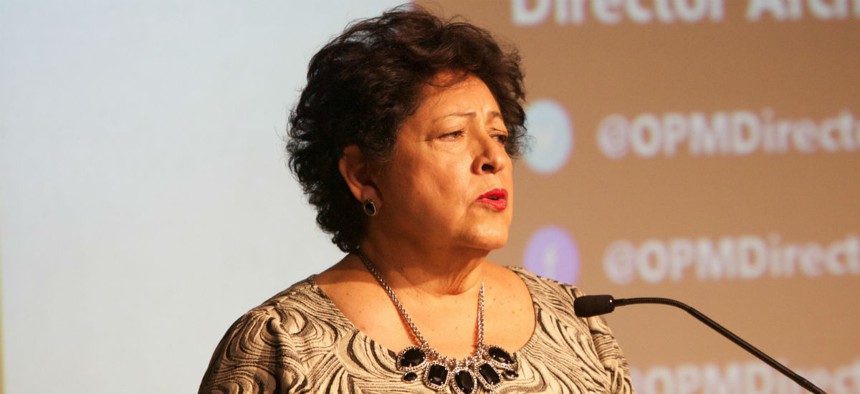
"Agencies should review the conference’s agenda, session descriptions and additional information, as appropriate," OPM Director Katherine Archuleta said in a memo. Education Department
OPM to Agencies: You Decide Whether Or Not a Conference is Legit
Personnel agency is scrapping long-time practice of reviewing whether conferences qualify as training.
The Office of Personnel Management has stopped its long-time practice of reviewing individual agency conferences to decide whether they qualify as employee training under the regulations.
OPM Director Katherine Archuleta said in a May 1 memorandum to the government’s chief human capital officers that OPM would discontinue issuing such guidance and wanted “to make clear that agencies are responsible for their employees’ training and development as provided by the statute and regulations, 5 U.S.C. chapter 41 and 5 CFR Part 410.”
The announcement is not a change in policy, said an OPM spokesman, as OPM is not required to review whether agency conferences qualify as training. The agency began the practice more than a decade ago, but the “usefulness of the memoranda came into question during OPM’s internal review of the practice,” the spokesman said.
OPM is effectively telling agencies to figure out on their own whether a conference meets the training criteria as stipulated under Title 5. According to Archuleta’s memo agencies may sponsor an employee's attendance at a conference as training under section 4110 of title 5, United States Code, if the event meets these criteria:
(a) The announced purpose of the conference is educational or instructional;
(b) More than half of the time is scheduled for a planned, organized exchange of information between presenters and audience, which meets the definition of training in section 4101 of title 5, United States Code;
(c) The content of the conference is germane to improving individual and/or organizational performance; and,
(d) Development benefits will be derived through the employee's attendance.
“When making this determination, agencies should review the conference’s agenda, session descriptions and additional information, as appropriate,” Archuleta said in the memo. “We encourage agencies to continue to consider professional training organizations and affinity groups as a source of training. If you have questions regarding training, you should consult with your chief learning officer or training officer for guidance.”
Here’s an example, from a June 28, 2013, memo from then-acting Director Elaine Kaplan, of the type of guidance OPM sent out regarding whether conferences met the criteria for training:
International Public Management Association for Human Resources (IPMA-HR) will hold its 2013 Joint IPMA-HR/IPMA-Canada International Training Conference from September 21 to September 25, 2013, in Las Vegas, NV. The theme for this conference is "Staying on Target of HR."
IMPA’s 2013 Joint IPMA-HR/IPMA-Canada International Training Conference qualifies as training in compliance with 5 U.S.C. Chapter 41. The training, open to all Federal employees, will feature training and workshops in areas such as Job Analysis, Public Sector Compensation, and Workforce Analytics.
Before participating, Federal employees and their managers should review additional conference and training information such as course descriptions, costs, schedules at http://www.ipma-hr.org/.
Agencies are reminded that reporting of training is governed by 5 CFR 410.601.
Employee travel and agency-sponsored conferences came under intense scrutiny in 2012, when it came to light that the General Services Administration had spent more than $800,000 on a 2010 conference in Las Vegas for employees that featured a mind reader and commemorative coin set, among other things. In May 2012, the Office of Management and Budget issued a governmentwide memorandum directing agencies to spend less on employee travel and conduct thorough reviews of conference costs to comply with policy as well as save money.
While the directive has reduced travel and conference spending, it also has created paperwork headaches and other red tape for some agencies. The National Institutes of Health, an agency that views conference attendance as a vital tool for employees to collaborate with and learn from colleagues, reported spending $15 million in 2014 alone on doing the necessary legwork -- reviewing, tracking and reporting -- to adhere to conference approval policies. “Many of these activities are events specific to our research mission as opposed to events that have broad government/public appeal,” the agency said in an emailed statement.







